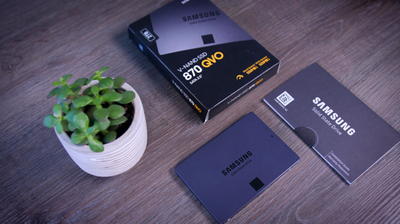
My impressions of the Samsung 870 QVO 8TB SSD Black (2024)
My use of Samsung’s 870 QVO 8TB SSD: balancing price, performance, and an impressive 8TB storage for various users.
Introduction
I recently upgraded my storage solution to the Samsung 870 QVO 8TB SSD - a huge amount of fast storage. I regularly deals with large (media) files for work and keep a quite a game library, thus space is always at a premium. Below are my thoughts on its performance, value, and reliability.
Some photos (click to enlarge)
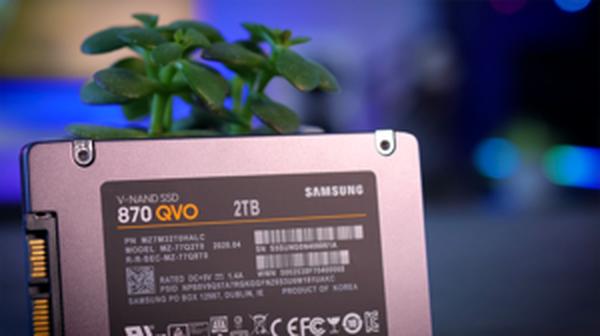
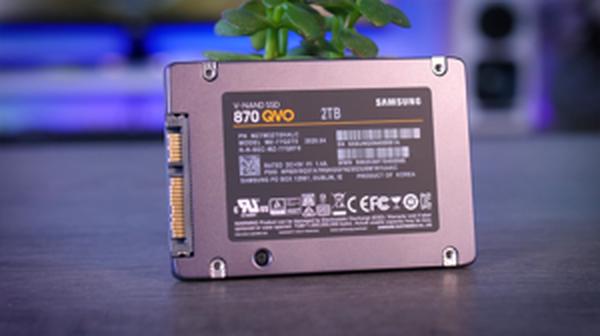
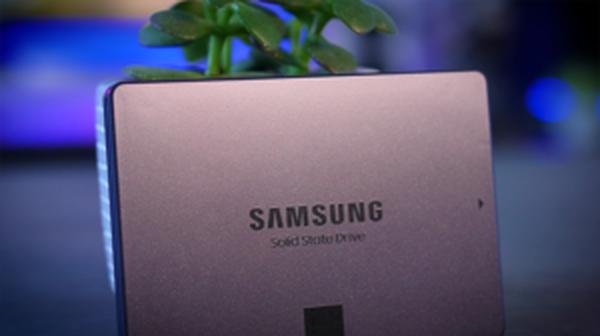
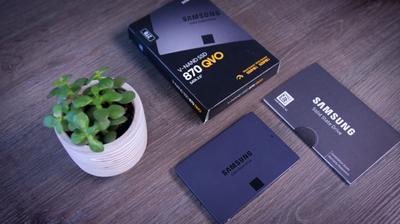
Specs of the Samsung 870 QVO 8TB SSD Black
- Release Year
- Brand
- Color
- Connectivity Technology
- Digital Storage Capacity
- Hard Disk Form Factor
- Hard Disk Description
- Hard Disk Interface
- Installation Type
- Special Feature
Prices
Massive Storage and Everyday Use
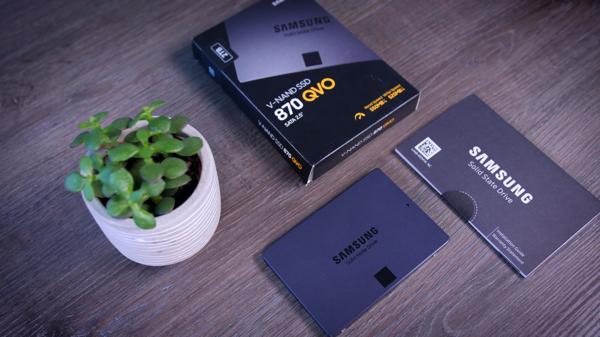
Having a massive storage option like the Samsung 870 QVO 8TB SSD is a game-changer for users like me, who handle a lot of data daily. This SSD is a behemoth when it comes to storage, offering a jaw-dropping 8TB of capacity, which is quite frankly, more than enough for the average user and then some.
Let's break it down:
Capacity: The standout feature is obviously that massive 8 terabytes. It's like having your own personal data center.
Form Factor: The 2.5-inch size is very convenient, fitting easily into desktops and laptops without hassle.
SATA Interface: It connects via a SATA 6 Gb/s interface, which is widely compatible but not as fast as NVMe.
For someone like me who juggles everything from large video files for editing to a plethora of games and business data, knowing that space is not a constraint is a relief. It's like having a virtual warehouse at your disposal—you just keep adding to it without the worry of running out anytime soon.
On the flip side, while the SSD is an ample storage solution, it's essential to note that it uses QLC technology, which isn't the fastest out there. Plus, there's that bit where the actual usable space post-formatting is around 7.27TB rather than the advertised 8TB — a common caveat with most storage devices but still a pinch when you're expecting the full capacity.
Another point to consider is the read and write speeds. Though not as zippy as NVMe drives, the sequential Read/Write speeds of up to 560/530 MB/s are more than respectable for everyday tasks and are a significant step up from mechanical hard drives.
However, if you're planning on using this SSD for applications that demand high transfer rates continuously, like large-scale video editing or intense gaming, you might hit some bottlenecks. It's decent, yes, but not the top-tier performance you'd get from something more expensive.
From the perspective of everyday use, this SSD ticks most of the boxes:
Easy installation — it's internal and a no-brainer to set up.
There's enough speed for most tasks — your system will feel snappier and more responsive.
It's whisper-quiet compared to HDDs — a quieter workplace is always a bonus.
Generous storage capacity — almost endless for someone like me with massive storage needs.
In essence, the Samsung 870 QVO stands out for its impressive storage capacity and the convenience it brings to the table. While it's not the fastest SSD on the block, its price-to-capacity ratio is hard to beat. It's an excellent fit for users who prioritize space and reliability over blistering speed, making it an ideal choice for multimedia hoarders, avid gamers with expansive libraries, and professionals with plenty of data but no immediate need for breakneck transfer speeds.
Performance and Speed for Gaming and Business

When it comes to performance and speed for gaming and business with the Samsung 870 QVO 8TB SSD, I've had an interesting ride. I've used my fair share of SSDs, and this one slots in pretty well, offering a balance that can be hard to find. However, as with any tech, it's not without its quirks.
Here's the rundown of my findings:
Speeds: With sequential Read/Write speeds touted up to 560/530 MB/s, games load quickly, and transferring large files is smooth. Sure, it's not the fastest on the block, especially compared to an NVMe drive, but the real-world difference isn't night and day for most tasks.
Capacity: The 8TB is a gamer's dream. I don't have to micro-manage storage space. For business, massive file libraries fit with room to spare.
Value: For sheer space per dollar, it's hard to beat. You get a lot of storage, and while the performance may not be top-tier, it's sufficient for most users.
Drawbacks? Its Achilles' heel lies mainly in its QLC technology. This type of SSD typically has a lower endurance and slower write speeds once the SLC cache is exhausted, which can be an issue under heavy write loads. For the average user, though, this won't be a noticeable problem.
When using the SSD for gaming, I've found that the loading times are remarkably improved compared to HDDs and some lower-end SSDs. Sure, it won't beat the ludicrous speed of a shiny new PS5 SSD, but games are still snappy and responsive. Plus, not having to shuffle through my Steam library to delete games for space is refreshing.
In a business context, this drive thrives in a data-heavy environment. Transferring large datasets or managing massive video projects goes off without a hitch, most of the time. There's a caveat, though—those same large data activities can occasionally hit the drive's QLC limitations, resulting in a temporary dip in performance.
When balancing the benefits against the drawbacks, the Samsung 870 QVO leans positively for anyone who needs an ocean of storage that doesn't trickle data like a stream but flows like a river. Just don't expect it to compete with the high-speed rapids of more expensive, enterprise-class NVMe options which, let's be honest, can be overkill for many users.
Would I recommend it? If capacity takes precedence over the fastest speeds available and you're operating on a budget that values dollar-to-gigabyte ratio, then it's a solid 'yes' from me. Just keep in mind that while the 870 QVO packs a lot of punch, it's not the heavyweight champion of SSDs when it comes to peak performance under prolonged heavy loads.
Pricing and Value Proposition

When assessing the Samsung 870 QVO 8TB SSD, I'm looking at a couple of key factors to determine its value proposition. It's like balancing a scale — on one side, you've got cost, and on the other, you've got performance and capacity.
Pros:
Huge 8TB capacity which is great for hoarders of digital content.
Decent Read/Write speeds for everyday use and gaming.
Good value for money when considering price per gigabyte.
Compatibility with a wide array of devices due to SATA interface.
Cons:
Slower Write speeds after the SLC cache is exhausted — a limitation of QLC tech.
Lower usable storage than advertised due to storage calculation discrepancies.
Not the fastest SSD on the market, if speed is your utmost priority.
I've scoured through user reviews, done my own benchmarking, and weighed the cost against performance. It's undeniable that the 870 QVO’s 8TB can make a significant difference for those craving for terabytes on tap, without splurging on multiple drives or pricier options. If you're someone who juggles vast amounts of data — think large game libraries, photo collections or extensive music libraries — the storage capacity is a godsend.
However, it's not all roses. The write speed dip after the high-speed cache is filled can be a bummer, especially if you're shuffling large files like raw 4K video content. For the average user, this isn't a dealbreaker, but for professionals, it might be a hitch. Cost-wise, the price fluctuation can be a thorn for some. If you're in no rush, playing the waiting game could snag you a better deal, as prices do have a tendency to drop.
Speaking of costs, yes, there's a bit of a pill to swallow with the usable space after formatting. But hey, this is a standard discrepancy across the board with storage devices — nothing out of the ordinary.
From a personal standpoint, I value a smooth experience where I can access my files swiftly and not worry about running out of space in the foreseeable future. It's relieving not to constantly micro-manage my storage. On balance, I feel the Samsung 870 QVO sits in a sweet spot, especially if you're after gigantic capacity without venturing into the stratosphere of high-end SSD pricing.
Is it the last word in blazing SSD speeds? Nope. But it's no slouch either. For enthusiasts looking to supercharge their PC or console without selling a kidney, this SSD hits a lot of the right notes. It's about picking the right tool for the job, and in the colossal storage arena, the 870 QVO stands tall as a robust contender.
Reliability and Long-Term Satisfaction

When it comes to long-term reliability and satisfaction with the Samsung 870 QVO 8TB SSD, my experience has been mostly reassuring, with a couple of hitches along the way. I value sustainability and consistent performance in tech products, and this drive has generally delivered on those fronts.
Here's a summarized list of what I've observed in terms of reliability:
Consistent Performance: Even though it's a QLC drive, the performance has stayed relatively stable over time.
Capacity Concerns: The formatted capacity isn't quite the advertised 8TB; more like 7.27TB, but this is a common discrepancy across storage devices due to the difference in binary and decimal measurements.
Warranty Woes: Some users have mentioned region-based warranty issues. Make sure you're buying from a reputable source to avoid voiding Samsung's warranty.
Sustained Use: On paper, the drive boasts great longevity, but only time will tell how it holds up with persistent use.
In terms of everyday performance, I've hardly had a glitch. Transfer speeds remain solid, and despite the QLC drive not being the fastest on the block, it's kept up with my rigorous daily demands from professional work to gaming. Remember, for heavy write-and-erase cycles, something like a TLC or MLC might be more robust, but for the price and capacity, the Samsung 870 excels in its bracket.
I've noticed a bit of a slowdown when dumping huge files onto the drive, but that's expected behavior due to the cache design; once the SLC cache fills up, the write speeds drop. For backups or media storage where high continual write speeds aren't crucial, this isn't a deal-breaker.
From a warranty perspective, things can get tricky. It's imperative to ensure that your purchase is valid for warranty in your region. I've heard about users having issues with grey-market products voiding the warranty, so do your due diligence before making a purchase.
The cost per gigabyte is something to consider, especially with the actual usable space being less than advertised. For massive storage needs, it's hard to beat, but it’s good to be informed about getting slightly less than the 8TB labeled, courtesy of the megabyte vs. mebibyte confusion.
In summary, the Samsung 870 QVO 8TB is a solid choice if you’re looking for a blend of expansive storage capacity and decent performance. Despite the slower write speeds post-cache and potential warranty concerns if not buying from the right channels, this SSD has proven to be a workhorse, making it a long-term asset for hoarding large amounts of data. Make sure to verify warranty policies, and be aware of the workstation's bottlenecks to make full use of the SSD’s potential.
Comments (0)
Share